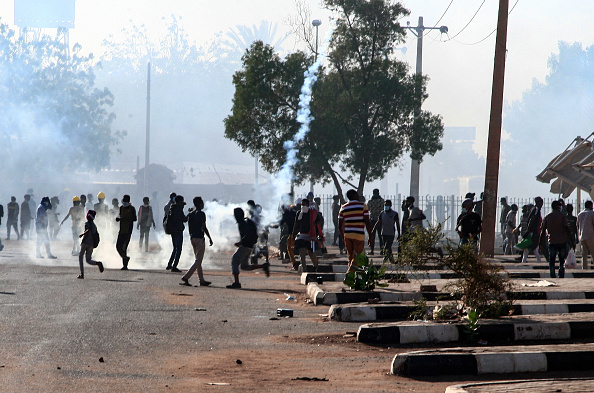Khartoum – Sudanese security forces fired tear gas on Tuesday at anti-coup protesters in Khartoum chanting slogans against the military days after the resignation of the country’s civilian premier, witnesses said.
Protesters shouted “No, no to military rule” and called for the disbandment of Sudan’s ruling council headed by General Abdel Fattah al-Burhan, who led an October 25 coup that derailed a transition to civilian rule.
Thousands of protesters gathered across Sudan, including in Khartoum and its twin city of Omdurman as well as the eastern city of Port Sudan and the South Darfur capital of Nyala.
Demonstrators in east Khartoum “burnt car tyres and built rock barricades on the streets,” witness Sawsan Salah said.
Other protesters urged the military “to go back to the barracks.”
Streets leading to the presidential palace and army headquarters were sealed off amid a heavy presence of troops, riot police and paramilitary units, the witnesses said.
ALSO READ | Sudanese security forces deploy ahead of planned anti-coup protests
Pro-democracy activists have stepped up calls for demonstrations since the October coup which saw then-prime minister Abdalla Hamdok and cabinet ministers detained.
The coup has triggered mass demonstrations and a bloody crackdown that has left at least 57 people dead and hundreds wounded, according to the independent Doctors’ Committee.
At least 13 women have allegedly been raped during the unrest, according to the United Nations.
On November 21, Burhan reinstated Hamdok in an agreement promising elections in mid-2023, but the protest movement slammed the deal as a “betrayal” and has kept up its protests.
Late Sunday, Hamdok announced that he was stepping down, saying he had tried to prevent the country “from sliding toward disaster” but that it was now at a “dangerous crossroads threatening its very survival”.
‘Urgent action’
Arab League chief Ahmed Aboul Gheit said Tuesday that he “respects” Hamdok’s decision and called for “urgent action” to resolve the crisis.
UN chief Antonio Guterres “regrets that a political understanding on the way forward is not in place despite the gravity of the situation in Sudan”, UN spokesman Stephane Dujarric said on Monday.
Sudan has been navigating a fragile transition towards full civilian rule since the April 2019 ouster of veteran president Omar al-Bashir following an unprecedented wave of youth-led protests.
ALSO READ | Sudan PM quitting risks return to Bashir-style rule, analysts say
Activists online had urged demonstrators to head to the presidential palace in Khartoum “until victory is achieved”, according to the Sudanese Professionals Association, an alliance of independent trade unions that was instrumental in the anti-Bashir protests.
Last month, Burhan issued a decree allowing security forces to arrest individuals “over crimes related to the state of emergency”, effectively banning street protests.
Security forces are allowed to enter and search “any building or individual” and impose “surveillance of any property and facility”.
Since the coup, authorities have often disrupted internet services and communication lines to make it more difficult for activists to organise protests.
Follow African Insider on Facebook, Twitter and Instagram
Source: AFP
Picture: Getty Images
For more African news, visit Africaninsider.com


